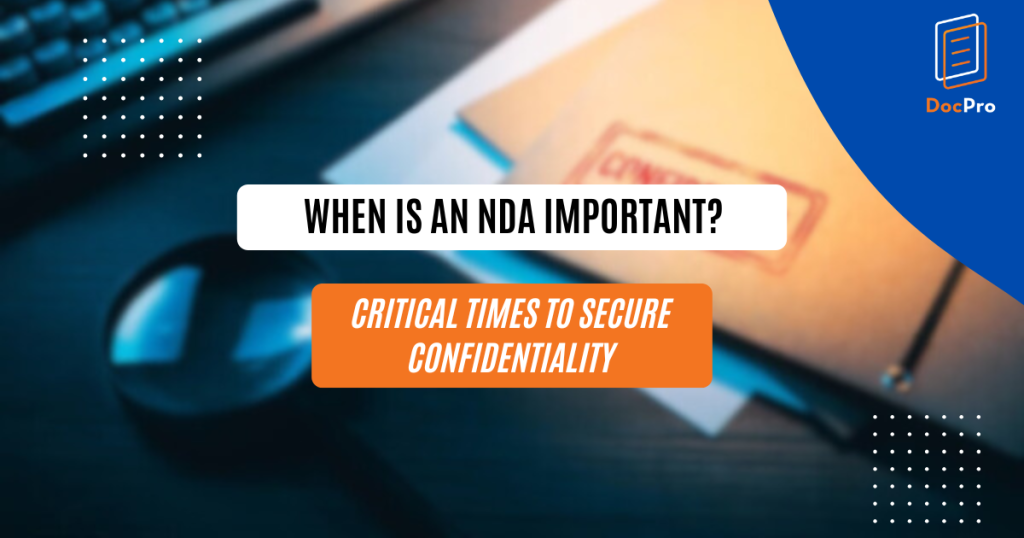When is an NDA Important?
16 Oct 2025
3 Oct 2025
min read

When is an NDA Important?
Non-Disclosure Agreements (NDAs) are pivotal legal tools that safeguard sensitive information shared between parties during business transactions, collaborations, and even casual exchanges of ideas. Today, protecting sensitive information is not just a legal formality – it’s a strategic necessity. Whether you're a startup founder, a freelancer, or a corporate executive, understanding when an NDA is important can save you from costly legal battles and lost intellectual property. This guide explores the critical moments when a non-disclosure NDA becomes essential, how it functions, and why it’s a cornerstone of modern business relationships.
What is an NDA?
An NDA is a legally binding contract creating a confidential relationship between the parties involved. The party or parties signing the agreement agree not to disclose information covered by the NDA.
There are two primary types of NDAs:
-
Unilateral NDA: One party agrees not to disclose confidential information.
-
Mutual NDA: Both parties agree to keep each other's information confidential.
Why NDAs Matter
NDAs play a pivotal role in safeguarding a company’s intellectual property, maintaining competitive advantage, and fostering trust in partnerships. Here’s why they’re crucial:
-
Prevent unauthorized disclosure of proprietary information.
-
Protect sensitive business strategies and financial data.
-
Secure client and vendor relationships.
-
Ensure compliance with data protection laws.
When is an NDA important?
An NDA is important when you need to protect valuable or sensitive information from being misused by another party who you (the “Disclosing Party”) are disclosing information to (the “Receiving Party”). Understanding the right moment to use an NDA is key. Below are the most common and critical scenarios where an NDA might not just be helpful, but also indispensable.
1. Business Negotiations:
When two companies or individuals are exploring a potential partnership, merger, or acquisition, sensitive information is often exchanged. An NDA ensures that:
-
financial records;
-
business strategies;
-
client lists; and
-
operational processes
remain confidential, even if the deal falls through. NDAs protect the individual companies’ details while they are being shared during negotiations. NDAs can also protect the details of any potential deals from leaking to competitors.
2. Selling or Buying a Business
If the deal moves forward, during the due diligence phase of a business sale or acquisition, both parties need access to sensitive information. An NDA ensures:
-
Financial data remains private.
-
Employee and customer information is protected.
-
Trade secrets are not exposed.
Read more about mergers & acquisitions in our Mergers and Acquisitions / Completion Certificate post.
3. Employment and Contractor Engagements:
Employees and independent contractors often gain access to confidential information. An NDA is crucial to:
-
protect trade secrets;
-
prevent data leaks; and
-
maintain client confidentiality.
This is especially important for roles in:
-
Software development
-
Marketing and branding
-
Product design
-
Executive leadership
Employees with access to confidential information are often required to sign NDAs to prevent the leakage of strategic business details, like business plans, customer lists, marketing strategies, or other information that gives the company a competitive advantage that would be lost if the information was disclosed to outsiders. Even within your own company, NDAs can be vital. Use them when:
-
Launching new products
-
Conducting R&D
-
Holding strategic planning meetings
This prevents leaks from disgruntled employees or accidental disclosures.
Contractors and suppliers may also be required to sign NDAs, ensuring that any sensitive information shared during their engagement remains confidential.
4. Pitching to Investors or Partners
When pitching a new product, idea, or business plan to potential investors or partners, you’re revealing your intellectual property. An NDA helps:
-
prevent idea theft;
-
maintain first-mover advantage; and
-
protect your business model.
5. Collaborating with Vendors or Suppliers
When working with third-party vendors, you may need to share:
-
Product specifications
-
Manufacturing processes
-
Marketing strategies
An NDA ensures that your proprietary information isn’t shared with competitors or misused.
6. Licensing Intellectual Property
If you’re licensing your intellectual property (IP) – such as software, trademarks, or patents – an NDA is essential to:
-
Protect your IP rights
-
Define the scope of use
-
Prevent unauthorized replication
This is especially relevant in industries like:
-
Technology
-
Entertainment
-
Pharmaceuticals
Benefits of using NDAs
When used correctly, NDAs offer numerous advantages:
-
✅ Strengthen business relationships
-
✅ Encourage open communication
-
✅ Protect competitive edge
-
✅ Reduce legal risks
-
✅ Enhance investor confidence
Finding the right NDA template that fits the specific needs of your situation can be challenging. DocPro offers 10+ Non-Disclosure Agreement (NDA) templates, designed to meet diverse requirements. Whether you're a startup, a large corporation, or a freelancer, DocPro has a ready-to-use template vetted by lawyers that provides solid protection.
Visit DocPro today to easily create your own NDA.
Keywords:
